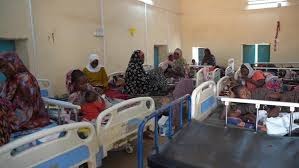“Liberation” Article : Breaking the Silence in Sudan is not Enough and We Must Take Action

Sudan Events: Report
This is how many Sudanese are trying to escape from the war zone in Darfur (Reuters)
Two billion euros were pledged to the International Humanitarian Conference for Sudan, which was held on Monday, April 15, but this is far from covering the needs of the humanitarian catastrophe unfolding in this country, due to its magnitude.
With this paragraph, the director of an international relief organization prefaced her article in the French newspaper “Liberation”, at the beginning of which she expressed her relief that the world had finally begun to care about what was happening in Sudan after a year of ignoring it.
Justine Muzik-Bikimal, regional director of the non-governmental organization Solidarity International, said that when she talks about the crisis in this country, she does not utter mere words, but rather talks about a catastrophic situation, affecting 24.8 million people, or one in every two people in Sudan, needs humanitarian aid.
The director pointed out that non-governmental organizations continued to sound the alarm of a looming famine, especially in the Darfur region, explaining that estimates indicated at the beginning of this year that nearly 5 million people were in a state of food emergency, which means, in concrete terms, that millions Children no longer have the strength to stand, in light of the continuing daily bombings, battles, and displacement.
She added that the violence caused the displacement of huge numbers of Sudanese, and nearly two million of them found refuge in already fragile neighboring countries such as Chad, South Sudan, Egypt, Ethiopia and the Republic of Africa.
But Bikimal praised the international humanitarian conference devoted to the situation in Sudan and its neighbors, which was organized by France, Germany, and the European Union, hoping that this would represent the beginning of a solution to the funding shortfall, which until now had been enormous.
She stated that the international community estimated the needs of the population in this country at about 4.01 billion dollars, of which only 7% were provided.
The writer stressed that moving proportionately now would prevent the crisis from reaching a broader scale, explaining that the way to do this is to transform funding promises into concrete actions, and to ensure that the planned funding is provided to non-governmental organizations present on the ground, while ensuring the arrival of humanitarian aid to the population.
Bikimal called for the immediate opening of the borders and the removal of all obstacles that make non-governmental organizations unable to deliver aid to those who need it inside Sudan.
She said that these obstacles are primarily violence, as it is still impossible to reach entire sectors of the Sudanese population who are in dire need of assistance.
She added that reaching the city of Khartoum, which was caught in the midst of the war, is almost impossible, and the city of El Fasher is suffering from a catastrophic humanitarian situation due to the lack of supplies.
Bikimal quoted teams affiliated with her organization as saying that the end of last week alone witnessed the flight of 50,000 people due to the ongoing fighting in this region.
According to Bikimal, political choices and administrative restrictions are also obstacles that must be overcome by opening borders and issuing visas to reach those in need of assistance.
The writer pointed out that what forces her to talk about millions of people and billions of dollars is trying to describe the enormity of the situation, but nevertheless, she refuses to let the lives of people suffering from war, famine and poverty in Sudan disappear “behind this cold accountability.”
We must, she says, make these stories and testimonies heard in circles where, in many cases, we only find reports and analyses.
She added that all those affected describe the same situation: hours of walking to escape the fighting, leaving everything behind, the inability to cultivate lands due to armed violence, and parents who are starving for their children to eat. Some have even reached the point of feeding on tree bark, leaves, and peanuts peels.
She warned that images of malnourished children would soon flood the media, praising the new interest of the international community and calling for it to continue vigorously.
She concluded by saying that if what she called for did not happen, the world would bear joint responsibility for the famine in Darfur, and promises must be followed by concrete measures, “as this is our collective responsibility,” as she put it.
Source: Liberation



